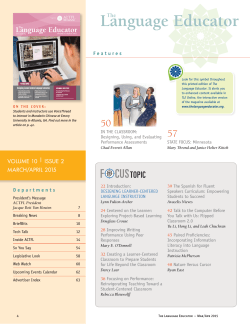
John Webber, Sussex Downs College
Steps towards students as digital leaders: From student voice to student agency and leadership John Webber Project Manager: Learning Technology Innovation Sussex Downs College @jwwweb The changing teacher-student partnership (summarised as prepositions) at & to –> for –> with & by The changing teacher-student partnership Quote from a recent email from a colleague conducting an action research with flipped learning » “My students are blowing me away with their work...” » “...I feel so proud of the way the AS students have taken responsibility...” » “Both groups are unanimous in their endorsement and enjoyment...” » “The work the kids are doing is empowering and meaningful.” 27/03/2015 3 Student voice as part of Quality Assurance » Student surveys and focus groups to inform quality judgments: » Usually closed questions against pre-determined standards » Limited opportunity to unpack students’ views » Generally do not invite suggestions from students 27/03/2015 4 From student voice to student agency and leadership Student feedback to inform summative evaluation of piloted innovation » Introduced as requirement for funded action research projects » Helped inform judgments of the effectiveness of the innovation » But still treated students as passive recipients 27/03/2015 5 From student voice to student agency and leadership 27/03/2015 6 From student voice to student agency and leadership Students as active participants in innovative practice » Proposed innovation discussed with students in advance › Establish shared understanding of the goals › Agree key principles » Students seen as partners in the process › Encouraged to provide feedback throughout via polls and focus groups » In-depth focus groups and interviews › actively inform adaptation and refinement of process 27/03/2015 7 THIS SLIDE REPLACES 3 POLL EVERYWHERE SLIDES At this point three ‘PollEverywhere’ slides were included asking participants to respond to the following questions: » How much impact do you think a student's beliefs about TL&A have on their learning? » What percentage of students agree with the following statement: “Peer assessment is a waste of time, only a teacher can assess your work” » What are your views on the following statement: “I think flipped learning wouldn't work because too many of the students wouldn't do it” › “Flipped learning” was defined as an approach which entails students learning key content (typically from a video ‘screencast’ or audio podcast) before they come to class 27/03/2015 8 The power of beliefs about learning Surveys with students have shown that »Roughly 2/3rd of students polled, think peer assessment will be a waste of time »Over 2/3rd of students predict flipped learning wouldn’t work »And yet... 27/03/2015 9 THIS SLIDE REPLACES A VIDEO OF TWO COHORTS OF STUDENTS SHOWN AT THE EVENT Two short excerpts were shown of students talking about peer assessment were played at this point » In the first excerpt students say “I do think asking us to mark each others’ work is one of the worst teaching methods. We all hate it” » In the second excerpt students say “It’s great.” “We love it!” “I think everyone when it starts in AS is a bit apprehensive but..” » It was the second group that did outstandingly well in the end of year exams. » The point being that students can have unhelpful preconceptions of learning based on prejudice or previous poor experiences that need to be challenged 27/03/2015 10 The power of beliefs about learning Whose preconceptions? »“I think the biggest factor that hinders peer assessment and flipped learning is the attitude that it is approached with. Teachers assume students take a begrudging approach to it which actually rubs off on them.” ›A2 student 27/03/2015 11 Case study of students as partners in innovation: Flipped Learning Flipped Learning – what the students told us » Initial response 27/03/2015 13 Flipped Learning – what the students told us “The iPad of shame” “Set and maintain clear expectations” 27/03/2015 14 Flipped Learning – what the students told us » “We like:” 27/03/2015 15 Flipped Learning – what the students told us » We like: 27/03/2015 16 Case study of students leading innovation Students leading digital innovation » Dropped out of previous College » Now travel for over an hour » When consulted 2 weeks into course: › Proposed regular Skyped lessons » Teacher and College agreed to pilot 27/03/2015 18 Students leading digital innovation » Worked better than anyone expected » Students progressing faster than ftf » Despite difficulties » Or because of them? » Have developed high order collaborative skills › PISA » Now keen to join Student Digital Leaders 27/03/2015 19 Student Digital Leaders Next steps Students leading digital innovation Currently recruiting Student Digital Leaders » Students will be given access to research and debate › About TL&A › About Learning Technology » Participate in whole staff development days » Run student focus groups » Advise on Learning Technology strategy & implementation » Contribute to induction of both new students and new staff » and more that they will tell us! 27/03/2015 21 Time for discussion and questions Invitation to share: » Discuss the concept of Student Digital Leaders or any variation on this with a neighbour » What are your thoughts on the initiative (or any other aspect of this presentation? » Are there similar initiatives in your institution? » Have you any questions... » ...or experiences you would like to share? 27/03/2015 22 Find out more… Contact… John Webber Learning Technology Innovation john.webber@sussexdowns.ac.uk @jwwweb Except where otherwise noted, this work is licensed under CC-BY-NC-ND
© Copyright 2025


















